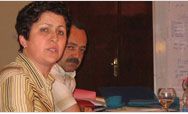USAID Fellows Program
BACKGROUND/PURPOSE:
According to the agency's July 1996 policy guidance on fellows, fellowship programs are intended to:
- Develop a pool of experts devoted to international development assistance;
- Provide individuals with practical work experience in the areas of humanitarian assistance and economic and social development; and
- Benefit the agency by providing research, technical advice, and intellectual stimulus.
The Fellows Programs provide USAID with fresh ideas, energy and the latest state-of-the-art technical knowledge, representing a broader set of specific expertise than is normally represented by the agency's U.S. direct hire employees. Fellowship programs are also a mechanism by which USAID can increase its outreach to partners, NGOs/PVOs, universities, and other donors. For the fellows, these programs introduce people to development issues and development institutions, give them visibility in the donor community, can help jumpstart their career, and help them with career choices at a critical time in their work development.
The Management Bureau sets overall agency ceilings for fellows. The Global Bureau is responsible for overall development and management responsibility for fellows programs, including distribution of the overall fellows ceiling among programs. The Global Bureau is also responsible for determining, in consultation with applicable bureaus, where fellows will be assigned.
Certain general rules apply to all agency fellows programs. According to the July 1996 guidance, as revised:
- Individual fellowships are to be limited to two years in duration --with extensions or combinations of different fellowships permitted up to a total of 4 years.
- USAID and providing institutions must keep an "arms length" relationship in the selection, placement, and day-to-day oversight of fellows. Fellows shall, neither encumber FTE positions, nor assume the duties or "inherently governmental" responsibilities of a USAID direct-hire position.
- The providing institutions are responsible for selecting individuals for placement based on the agency's needs statements. While AID retains a right to concur in the selection and placement of individual fellows, USAID employees shall not identify individual fellows to work in USAID-funded programs or in agency offices.
- USAID employees may provide fellows with technical guidance, career advice, and operational oversight, but may not supervise fellows or be supervised by fellows.
PLACEMENT OF FELLOWS IN NON-USAID LOCATIONS:
Although most fellows are placed in AID/W and USAID missions worldwide, occasionally fellows are placed in Non-USAID locations. Such placements provide an added value in accomplishing the strategic objectives of the agency, as well as those of the participating donor organizations and individual NGOs/PVOs in which agency fellows have been placed. The utility of such placements has proved particularly beneficial as an opportunity to strengthen coordination between NGO/PVO and USAID Programs and further capacity building objectives.
MENTORS AND WORKPLANS:
All Fellowship programs acknowledge and support interactions and activities that are aimed at enhancing the fellow's experience. To that end each Fellow will be assigned a USAID mentor who will oversee the Fellow throughout their fellowship. The mentor will work with the Fellow to development a workplan detailing the performance objectives to be accomplished during the fellowship. Workplans are critical to the process. The workplan is a tool for initial and follow-up discussions between the Mentor and the Fellow regarding technical work and professional development. Workplans are usually required within the first six months of the fellowship and are updated annually.
Back to Top ^
|




